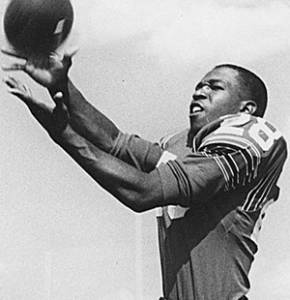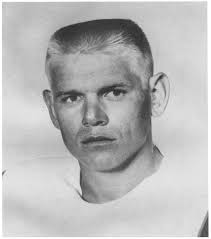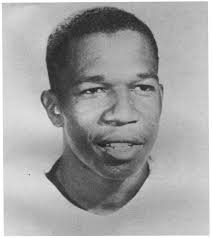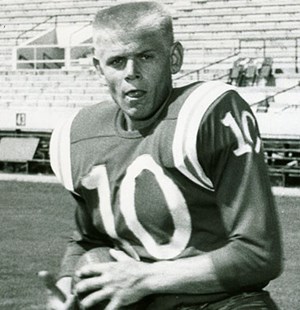Abner Haynes met his new teammates in August 1956, in a parking lot outside of Fouts Field on the North Texas State campus. He would be the first black football player in school history, and none of the White Eagles had been consulted on the matter. To be precise, he would be allowed to try out. Coach Odus Mitchell had not recruited him from Dallas’ Lincoln High School but was willing to let him show his stuff. Maybe the walk-on could contribute.
He stepped out of the taxi that had brought him and faced those boys. A few scowled, and he thought he might need the switchblade knife he had put discreetly in his pocket. But five came toward him, obviously without bad intent. They were led by a young man with blond hair, a freshman like Haynes. His name was Vernon Cole. He gave Haynes a shake and welcomed him. As Haynes later recalled, “I could have kissed him.”

The day of the first workout, there was some tension in the locker room. Haynes was being ignored by most of the other NTSC players except for Cole, again. Once fully dressed, he slapped him on the shoulder pads and said, “Come on, Haynes, let’s go.” They went out on the field and started running, tossing a ball around and getting loose. Haynes quickly showed that he could play, excelling as a running back, linebacker, and kick and punt returner. Cole was pretty good, too. He won the starting quarterback position, so he was handing off and throwing to Haynes that season when they played freshman ball. They endured a hellish game against Navarro College in Corsicana, students and fans of which just could not bear the thought of playing against an integrated team. Those people did not realize that America was changing.
Cole and Haynes played four seasons together, one as frosh and three on the varsity. Their record the final three years is indicative: 5-5 in 1957, 7-2-1 in 1958 and 9-2 (and a spot in the Sun Bowl) in 1959. Do you discern an upward trend?

It may have been during the summer before their senior season when a most amusing incident transpired. Cole had a convertible, so he and Haynes took it out for a cruise in the countryside around Denton. They put the top down and just drove wherever they wanted. I surmise that they talked about football and girls. Then came trouble as a police car pulled them over. The two officers were of European descent, as was nearly always the case in those days. They got out and walked up to the convertible. Unaware that they had stopped two stars from the local college football team, they began asking questions. Who were they? Where were they going? Where had they come from?
Of the convertible’s occupants, Cole did most of the talking and he was not reticent. He demanded to know why they had been stopped. They had not been speeding, and his car was fully registered. “What’s the deal, officers?” he asked.
One of them came up with a cock-and-bull story, saying that a bank in Denton had been robbed and the perpetrators were a White guy and a black guy. Cole and Haynes matched that description, and so they were just performing due diligence, you see. At this point, Cole called their bluff. He told the po-lices that he and Haynes were willing to go downtown and help resolve the matter.

Needless to say, these representatives of law enforcement understood that they had been busted. They were not the busters, but the bustees! Haynes, of course, knew about dealing with Jim Crow policemen. He quietly said, “Come on, Vern, let’s just go.” Cole apparently enjoyed watching the men in blue squirm. He again offered to accompany them downtown or at least to wait for some officers who knew about the “bank robbery” to arrive and see whether Cole and Haynes were the men they sought. Cole even urged them to inspect his car for the bags of stolen money they would have if they had just pulled a hold-up. The policemen at this point had to be embarrassed and wanted nothing more than to bring the whole ludicrous episode to a conclusion.
One of them went to the police car, pretended to call his detective boss at headquarters and returned to say the husky young men were free to go. They did, with wry smiles on their faces.
After a final season at North Texas and graduation, Haynes enjoyed a memorable career with the Dallas Texans, Kansas City Chiefs, Denver Broncos, New York Jets and Miami Dolphins of the AFL. Cole had also been drafted by the Texans. Whether he tried out and was cut, I do not know. But he had two seasons with the Canadian Football League’s Winnipeg Blue Bombers and Montreal Alouettes. This beautiful, strong White man, a native of Pilot Point, Texas, died of cancer in 1972 at the age of 34.


4 Comments
Richard:
A terrific article with good research. thanks for sharing. You mentioned that Cole
died in 1972 – is Haynes still alive?
Thanks,
Rex
Rex, thanks so much for your comment. Oh, yes, the great #28 is still alive and kicking down in Oakwood, TX. I think Cole is an endlessly fascinating person. You might think that a “White guy” from Pilot Point would have every excuse for being bigoted or racist, but not him. What character that took to walk across the parking lot and befriend Haynes when most of his teammates stood back and glowered? Not to mention his handling of the cops who pulled them over, hahaha!
A piece of “Americana” from bygone days written by wordsmith RAP is always a pleasure to read. Did not know of Mr. Cole but, indeed, he was a stalwart man of Christian beliefs to have peacefully dealt with two public hassles in his young life.
Thank you, Dex! Yes, Cole was something else….
Add Comment